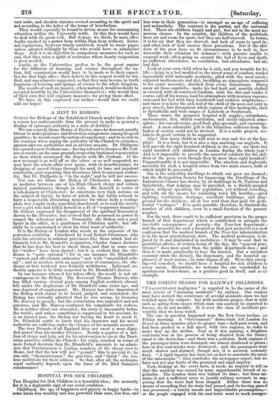HOSPITAL FOR SICK CHILDREN.
THE Hospital for Sick Children is a beautiful idea; the necessity for it is a deplorable sign of our social condition.
Childhood, the age of happiness and gayety in happy lands—in some lands less wealthy' and less powerful than ours, less free, and
less wise in their generation—is amongst us an age of suffering and melancholy. The contrary is the partial, net the universal fact. There are children happy and gay, but not in the most nu- merous classes. In the country, the children of the multitude have air and room for sport; but they are half-starved. In towns, it is for air that they are starved, and lack of room to sport in; and often lack of food crowns those privations. But if the chil- dren of the poor have no fit circumstances to be well in, how miserable their situation for sickness !—with parents unable to suspend work, often going on around the bed of fever and death, no sufficient attendance, no ventilation, bad attendance, bad air, bad diet.
Look at your own child when he is sick, and you tremble for his life,—lying in a bed modified to the nicest sense of comfort, tended incessantly with unbought assiduity, plied with the most nicely- adjusted medicaments and diet, breathing an atmosphere tempered to his exact necessity, shielded from every disturbance. Sweep away all those comforts,—make his bed hard and scantily clothed or covered with ill-contrived burdens, stint his diet and render it coarse, call off his nurses, load his atmosphere with noxious vapours, surround his bed with busy handicraft and reckless neighbours,— and there you have the sick-bed of the child of the poor, not only in poor streets, but throughout whole regions of this metropolis, such as Spitalfields and wide ranges of Lambeth or Southwark. These wants the proposed hospital will supply,—attendance, medicaments, diet, skilful ventilation, and nicely-adjusted atmo- sphere; for convalescents, good food, play-grounds, and encourage- ment. A more admirable gift to the blameless sufferers from the laches of society could not be devised. It is a noble project, cer- tain to do good, certain to be supported. Alas ! how many children will wish to stay and live at the hos- pital! It is a boon, but it is also a sign marking our neglects. It will provide for eight hundred children in the year : are there but eight hundred sick children in London during the whole year ? And is it impossible to provide the essential comforts for the chil- dren of the poor, even though they be more than eight hundred? Unquestionably it is not impossible. The absolute and deplorable necessity for such a hospital arises from two main causes, both of which might be prevented. One is the unhealthy dwellings to which our poor are doomed ; but the Metropolitan Society for Improving the Dwellings of the Industrious Classes has shown, by its buildings in St. Pancras and Spitalfields, that lodging may be provided, in a thickly-peopled region, without spreading the population, yet without crowding, and with all the means for rendering town life healthy,—good lighting, ventilation, drainage, excellent buildings, and play- ground for the children ; all at less rent than that paid for pesti- lential " cottages." It is quite possible, therefore, to diminish the number of sick children, even to a small fraction of the present number.
For the rest, there ought to be sufficient provision in the proper branch of that department which is established to mitigate the inevitable consequences of poverty—the Poor-law department ; and the necessity for such a hospital as that just projected is a new confession that the medical branch of the Poor-law administration is in the most unsatisfactory state. The medical profession is in- jured by it, and diminished in usefulness : it may be said that in gratuitous advice, at certain hours of the day, the "general prac- titioner" does more good than the public department does ; and thus he is made practically to bear the burden. But a mistaken economy stints the dietary, the dispensary., and the hospital ap- pliances of most unions—in some degree of all. Were that sweep- ing evil remedied, we should have a hospital for sick children in every union. Meanwhile, we welcome the one vouchsafed by spontaneous benevolence, as a positive good in itself, and as an example.


























 Previous page
Previous page